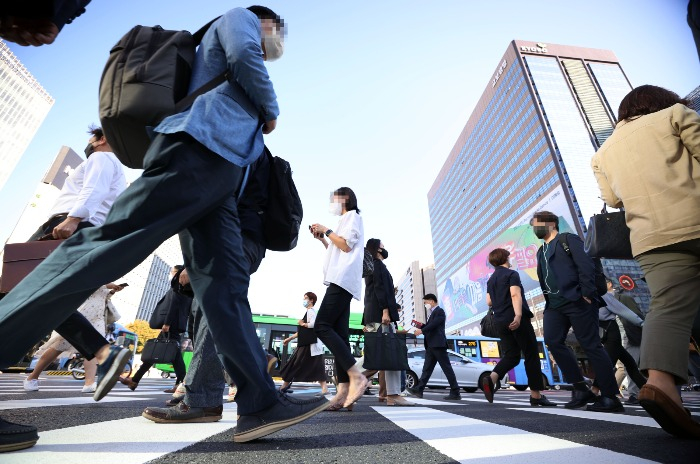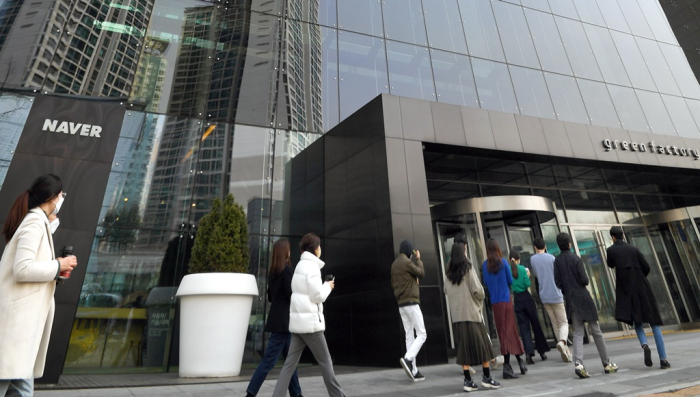Economy
Korean wage growth increases inflationary pressure
Surging consumer prices, housing costs, talent war push up Q3 wage growth to 3.5-year peak; stagflation woes emerge
By Dec 07, 2021 (Gmt+09:00)
3
Min read
Most Read
LG Chem to sell water filter business to Glenwood PE for $692 million


Kyobo Life poised to buy Japan’s SBI Group-owned savings bank


KT&G eyes overseas M&A after rejecting activist fund's offer


StockX in merger talks with Naver’s online reseller Kream


Mirae Asset to be named Korea Post’s core real estate fund operator



South Korea’s wage growth in the third quarter hit its highest point in three and half years, adding to inflationary pressure in Asia’s fourth-largest economy.
The average monthly total wages for regular workers with employment contracts of more than one year rose 5% to 3.75 million won ($3,172.9) in the third quarter from a year earlier, the largest growth since the first quarter of 2018 when wages increased 7.9%, according to the Ministry of Employment and Labor on Dec. 6.
Special payments, including bonuses, gained on strong corporate earnings while employees, especially millennials and Gen Zers, collectively known as MZers, demanded higher salaries. Major local companies such as Samsung Electronics Co., SK Hynix Inc. and LG Electronics Inc. discussed additional incentives after raising salaries by 7-9% this year.
Wage growth
Unit: %, Million won
Source: The Ministry of Employment and Labor
Source: MOEL
Graphics by Jerry Lee
Soaring consumer inflation cut the purchasing power of people and caused employees to demand more wages, some analysts said. Consumer prices soared 3.7% last month from a year earlier, the fastest growth since December 2011, government data showed earlier this month.
Higher salaries could result in a vicious cycle since companies could raise product prices to reflect higher wages, intensifying inflationary pressure.
This is not an issue only in South Korea. US Treasury Secretary Janet Yellen last week said the Federal Reserve should keep a close eye on rising wages to avoid the kind of damaging and long-lasting "wage-price spiral" seen in the 1970s, according to Reuters.
SURGING CONSUMER PRICES, HOUSING COSTS
The Bank of Korea forecast consumer inflation at around 2.4% this year, the highest since 2010, as the upward pressures from the supply side are expanding to the demand side. Household spending increased, while industrial activity and capital expenditures recovered. Rising demand pushed up prices of commodities and products.
Surging house prices are also a key factor. The housing price to income ratio (PIR) in the capital Seoul was 17.6 times in the third quarter, according to Kookmin Bank. That means one can buy property only if they save their income over 17.6 years without spending a penny. The PIR rose in the last three years to 16.8 times at end-2020 from 14.5 times at end-2019 and 14.3 times at end-2018.
Households had no choice but to require higher wages in order to maintain purchasing power amid surging inflation and property prices, some analysts said.
Growing digitalization due to the COVID-19 also fanned such trends as a talent war to aggressively hire developers and data analysts ramped up their salaries. Naver Corp., the country’s top online portal, employed about 900 software engineers this year, while other major information technology companies such as Kakao Corp. and Nexon Co. were scheduled to hire hundreds of the engineers by year-end. Zigbang, a property app operator, paid up to 100 million won of a signing bonus to experienced developers.

GROWING STAGFLATION WORRIES
Rising wages without improvement in productivity are feared to bite into corporate earnings and industrial competitiveness in the near term. Labor costs of local companies have been increasing. Compensation of employees including salaries accounted for a record 67.5% of the total national income last year, up 1.3 percentage points from 2019.
Local companies may raise product prices or cut jobs if labor costs keep rising since they have already been suffering from surging commodity prices. If the corporate sector cuts jobs because of growing labor costs, households will have to slash spending due to lower-income.
That could lead to stagflation – rising inflation with slowing growth. Companies and employees are expected to raise product prices and salaries due to expectations of higher inflation. In addition, the corporate sector is likely to slash employment and output.
To avoid such a vicious cycle, the country needs to ramp up productivity, experts said.
“The best solution to ease worries about inflation is productivity improvement including structural reforms,” said Yongsung Chang, a professor of economics at Seoul National University.
Write to Ik-Hwan Kim at lovepen@hankyung.com
Jongwoo Cheon edited this article.
More to Read
-
 EconomyKorean inflation nears 10-year peak in November, fanning rate hike views
EconomyKorean inflation nears 10-year peak in November, fanning rate hike viewsDec 02, 2021 (Gmt+09:00)
1 Min read -
 Central bankingBank of Korea raises interest rates, signals further hikes
Central bankingBank of Korea raises interest rates, signals further hikesNov 25, 2021 (Gmt+09:00)
3 Min read
Comment 0
LOG IN


